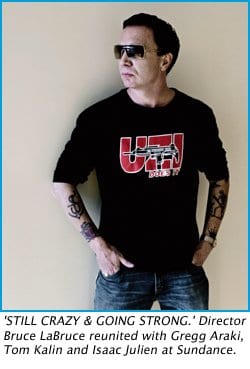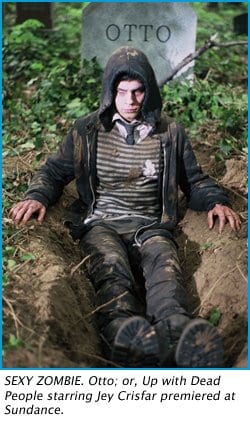In 1992, during a panel at the Sundance Film Festival, renowned academic and film critic B Ruby Rich proclaimed that the “New Queer Cinema” had begun. Soon-to-be-released films, aggressive in their treatment of queer culture, came to represent the term: Derek Jarman’s Edward II, Gregg Araki’s The Living End, Tom Kalin’s Swoon, Bruce LaBruce’s Super 8 1/2 and Isaac Julien’s Young Soul Rebels, most premiering at Sundance. Sixteen years later the festival held a reunion of sorts.
A staggering 44 films screened at the 2008 Sundance Film Festival featuring either queer themes or a queer director, among them a remastered print of Araki’s The Living End, Kalin’s incest biopic Savage Grave, LaBruce’s gay zombie flick Otto; or, Up with Dead People and Julien’s documentary on the late Jarman, Derek. In celebration of Derek, all four directors joined Rich at Park City restaurant The Windy Ridge during the first Saturday of the festival. “This room is filled with history,” said Rich, speaking to a room that also included actress Tilda Swinton (who hauntingly narrates Derek) and producer Christine Vachon.
LaBruce, who has screened films at Sundance four times, was the room’s most prominent Canadian. “It only makes sense that the four of us, still crazy and going strong after all these years, should celebrate together,” wrote LaBruce on his Sundance blog for CBC.ca.
LaBruce also participated in one of the many Queer Lounge panels. The one he shared with Julien tackled sexual provocation. “The reason I started making sexually explicit films in the first place,” said LaBruce, “was because I was sort of disillusioned with the gay world in the 1980s and I thought that even then it was becoming too conformist. For me I never really lost that motivation — using it as a provocative political tool.”
His provocation is in full bloom with Otto. The titular zombie (Jey Crisfar) roams German streets and hillsides driven by fuzzy memories of a boyfriend past. He is mistaken for a zombie-impersonator by the film crew making a “political gay zombie porno flick” and he begrudgingly participates in the film for the cash (allowing LaBruce to poke fun at the “pretentious pornographer” moniker that some critics have foisted on him). Described as a “one man revolution against reality” by the film-within-the-film’s director, Otto’s melancholic desires add an occasionally touching addition to LaBruce’s filmography — with gore and gay zombie fucking.
The screenings were met with the divisive response one might expect from a LaBruce film especially given the increasingly mainstream tenor of Sundance. Many patrons walked out, particularly during a scene in which one zombie fucks his victim’s flesh wound. But the ones who stayed made it clear they were happy with LaBruce’s latest work, giving him considerable applause.
Prior to the film’s premiere I spoke with LaBruce about Otto and his experiences at the festival.
BRUCE LABRUCE: Please allow me to introduce myself. I’m a man of no wealth and some taste. I’m a filmmaker, photographer, writer and artist who sometimes lives in the gulag of Toronto but who spends a lot of time in Berlin.
PETER KNEGT: Tell me about Otto. How did the idea for this film evolve?
LABRUCE: The idea for this film came from always running into kids in their late teens or early 20s who would tell me they felt like they were dead or dead inside. I related it to a spiritual malaise stemming from the deadening effects of advanced capitalism. So I figured it was time to make a zombie movie.
KNEGT: How does it compare to your other films?
LABRUCE: I had way more money this time because it’s easier to get financing for a genre movie. So it looks and sounds much better than usual. But it still has the same politics and analysis of my other films. But it’s more fashion-forward; Rick Owens did the costumes, for example.
KNEGT: Many of your films have screened at Sundance. What draws you to want to show your films here?
LABRUCE: I have a longstanding relationship with the US distributor Strand Releasing, who have rights to five of my titles in the US, and they have a very close relationship with Sundance. It’s really a great launching platform for an independent film. It has gone really Hollywood in the last five or seven years but the core programmers and staff of the festival are still really supportive of challenging and off-beat work.
KNEGT: There’s a lot of talk about the amount of queer content at this year’s festival but also a lot of reflection considering that you, Kalin, Julien and Araki will all be presenting work. What are your thoughts on this nostalgia?
LABRUCE: It is interesting because I’ve known Julien and Kalin and Araki since the early ’90s and it’s amazing that we’re still all kicking it. I’m particularly impressed with Tom Kalin, who hasn’t had a feature film in 14 years or something. Talk about a comeback. But it kind of makes you wonder why New Queer Cinema didn’t become a bigger phenomenon. I guess films come in waves and that was one of them. On the other hand, I’ve been on a few juries lately, like at the Copenhagen gay and lesbian film festival, and there are some really good queer films out there. The feature we gave the dramatic prize to, an Argentinian film called Glue, is really strong. And the documentaries were very good too. We gave the prize to an Israeli doc called Paper Dolls which was pretty amazing.
KNEGT: How do you see yourself evolving as a filmmaker and artist in the next decade or so? What’s your next project?
LABRUCE: I should also say that even though I had more money to throw around, I still had the luxury with Otto; or, Up with Dead People of pretty much having the freedom to do whatever I wanted. A lot of the financing came from my art world connections and they really didn’t interfere; in fact they encouraged me to go wild. So that’s important to me. I don’t know what the future holds. A lot will depend on the success of this film. I do plan on getting into even bigger budgets. Hopefully I won’t have to work with any grotesque celebrities.


 Why you can trust Xtra
Why you can trust Xtra


